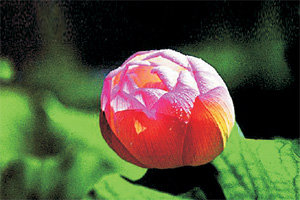The World Becomes a Garden As The Flower Within Blossoms
The World Becomes a Garden As The Flower Within Blossoms
Posted May. 13, 2005 23:37,

Every May, prior to the Day of Buddhas Coming, books on Buddhism swamp the shelves. This year, the books have avoided introducing the scripture or works by famous Buddhist priests and monks, and have focused more on ruminating the meaning of realization from daily activities. This reflects the growing recognition of virtue or meditation as going beyond religion, as a path to relieving stress, and finding peace of mind. Paradoxically, this might mean that people today are having that much of a tougher time finding peace of mind.
Humans dream of happiness. But what is happiness, and how do you obtain it? Does a billion won make you happy, as the catchphrase goes? The human being is never satisfied with eating and existing alone. This is a world where even those who bathe in luxury commit suicide.
Then what is happiness?
The precursors who speak of wisdom all voice in unison that the condition for happiness does not exist outside, it comes from within. A human beings heart and thought determines happiness or unhappiness.
The author of One Turn of the Heart and Happiness Smiles, yearns for daily Buddhism, practical Buddhism, and has been a fervid follower of a Buddhism sect founded in 1951, called Jingakjong. He recounts stories of ordinary people whom he met at missionaries, transforming their lives by fixing their hearts.
A daughter-in-law berated by her mother-in-law, a wife suffering from her husbands wandering eye, a family crippled without warning, bankruptcy, people deep in debt and rags barely holding on, and so on. A total of 44 tales of hellish lives altered into peaceful and happy ones by banishing negative thoughts that arise in times of hardship, such as anger, hatred, misery, and guilt, into positive thoughts like forgiveness, understanding, admittance, and hope.
Because the author is not a professional writer, the wording is awkward and contradictory, and even confusing and rustic at times. However, the vibrancy manages to convey the enlightenment that happiness is not so far off, after all.
Transforming ones matrix of thinking is no simple task. Changing your beliefs may be more arduous than sacrificing your life, as shown in the proverb that says martyrdom comes easier than converting.
The second book, Zen Diary, states that in order to change your thinking, special experiences are required in lieu of knowledge. This book, subtitled, 100 days of studying to awaken my sleeping heart, is a journal written by a Spanish literature doctorate who confesses that after contacting the world of Zen, 100 days of studying the heart was more effective than 20 years of acquiring knowledge.
At first, the author tried to practice Zen with the learned mind to end up on a dreary cliff, and was impatient to find realization. Through numerous trial and error experiences, he learns to observe his mind with clarity, and accepts and embraces his past scars from childhood instead of striving to expel the conflict and pain that he recoiled from all his life.
Gradually, he discovers that realization or happiness is not an abstract concept, but a simple truth that nests in the core of his heart. At the end of 100 days of Zen, the words of the author brim with genuine happiness and profound realization.
They say that you search for the child on your back, that you look for the cow youre riding on, and that you pursue whats in your heart. Now that Ive tried Zen, the logic is simple. What youre looking for is not outside, its inside! Since its already there, everything is fine. Just make sure its there, and start living. Since its there, you dont desire. Since there is no desire, there is no obstacle. If you look inside, your gaze becomes the falling rain. The rain awakens the seeds inside of you. Look up and see that the flower is smiling at you.
Mun-Myung Huh angelhuh@donga.com







